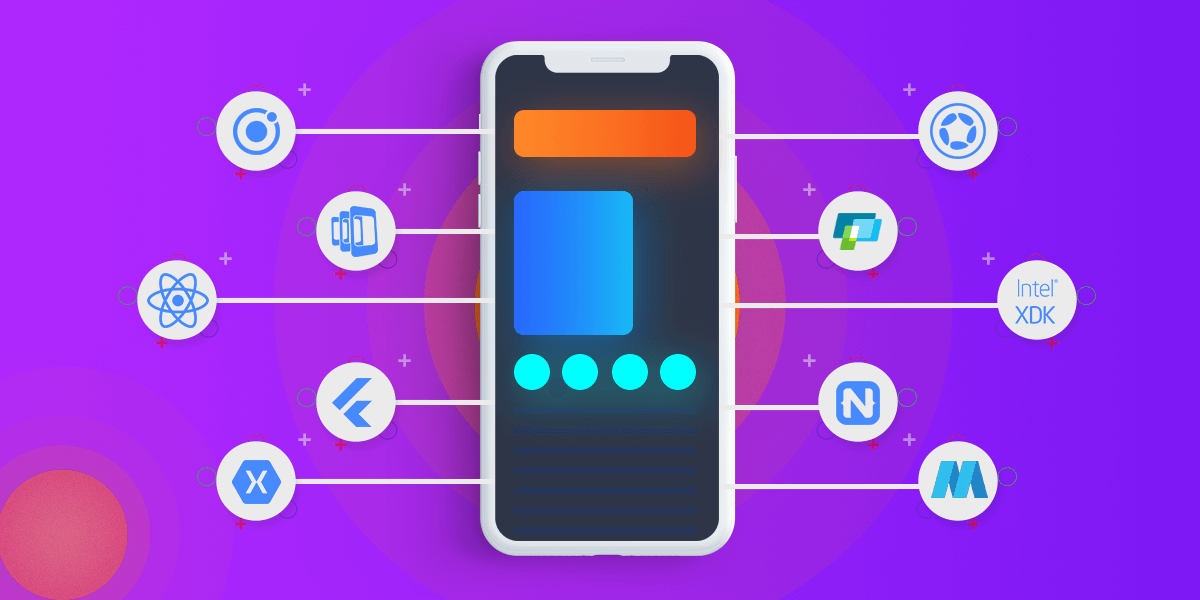According to a survey, it is seen that there are a total of 5 million apps available on the Apple play store and another survey reveals that a total 2.6 billion apps make their way to Google play store. Considering such huge numbers, business developers are making a paradigm shift and moving from native app development to hybrid apps.
Choosing either of them would be risking opportunities of growth and likewise success. Added with this, developers are also aware that when the budget is an issue, native apps charge more. This attributes to the fact that cross-platform app development is far more efficient than the standalone native apps.
When we talk about the cross-platform all development, the first thing that pops in our mind is the cross-platform framework which aids in developing efficient apps compatible with both the iOS and Android platform. So, before we shift our focus on the benefits of the framework over the efficiency of developed apps, let’s have a quick look at what exactly do we mean by the term cross-platform framework.
Cross-Platform App Development Framework
As the name says, Hybrid apps or the cross-platform app development frameworks are the ones that allow developers to build apps proficient enough to run on more than one platform and commonly the one as Android and iOS. Furthermore, developers can write code once and then run it at a different platform. Though the framework faced a lot of challenges and performance issues in early days, today it has surpassed the benefits provided by native apps and this rise doesn’t seem to stop or even pause.

Understanding The Difference: Native App Development Framework VS cross-platform App Development Framework
Native app frameworks are solely dedicated to building apps that run on a single platform. No app built using a native app framework would run on multiple platforms. In simple words, native frameworks target a specific platform whether Android or iOS. On the other hand, the cross-platform app development framework allows the written code to be executed on different platforms. Developers need not modify the code instead use the same for Android and iOS apps.
Also, developing a single app for multiple platforms helps reduce both the cost and time overheads. Where a native app requires more resources and likewise costs, hybrid apps employ lesser resources cutting down on the extra expenses.
How does cross-platform App Framework Improve App Efficiency?
As said above, the cross-platform app framework does the task of two under a single roof. This definitely affects the efficiency of the development phase, so let’s see how?
Allows Reusing Components Of Code
The fact that cross-platform app frameworks enable reusing codes, it leverages the app development efficiency in the sense that developers need not write different code for different platforms. A single piece of code could work effectively on different platforms. That is, the written piece forms the codebase which can then be implemented on multiple platforms. Owing to this, such a framework saves a lot of development time and thereby facilitates faster development of mobile apps.
High Speed
the cross-platform app development framework is designed to aid the development of apps that are multi-functional. By using the same code over and over again on different platforms, the total time is taken and efforts put in to develop apps get reduced by 50-80%. This is a way helps to reduce the overall development time and ensure faster delivery. Developers using the cross-platform app framework can adhere to the project deadlines and affirm on-time delivery.

Cut Down Unwanted Expenses
True that digitization is the future of business, however not all companies can withstand the cost incurred in developing an app. No doubt, Internet marketing lays down endless opportunities for the business owners to promote the same but being budget-restricted they fail to employ apps in their business. To deter this issue, cross-platform app development frameworks help developers build apps at considerable rates. Using a single code base on multiple platforms not only helps them deploy apps for their business but at different platforms too. This in a way reduces the total amount required for building apps for the business.
Does Not Require Experts
The fact that cross-platform app development frameworks are self intuitive, they do not necessitate the need for experts or skilled developers. One having a decent knowledge of the language can effectively build an app. The framework itself guides the developers to embed codes and move with the process of mobile app development.
Consistent In Components Of UI
cross-platform app development frameworks allow the development of apps that can function like native apps as well as hybrid apps. The built-in components of the user interface are consistently giving a uniform look and feel. At no point, will the user find it hard to navigate across the app? Also, the developers can extend the consistency to the desired level.
Quick Hosting
cross-platform app development frameworks are hosted easily on a different platform and do not pose threats of crash or breakdown
Easy Integration With Cloud
cross-platform app development frameworks allow quick and, seamless integration of developed apps with the cloud. Such apps can also be integrated using the external plugins thereby adding universal compatibility to the same.
Less Technical Barrier
Since cross-platform app development frameworks do not require the knowledge of the additional language, one does not have to learn additional languages to use the platform.
So, the list goes on. Undeniably such a framework is highly proficient in enhancing the efficiency of developed apps. No wonder, why cross-platform app development frameworks are being the choice of all developers worldwide.
 May 30, 2019
May 30, 2019







